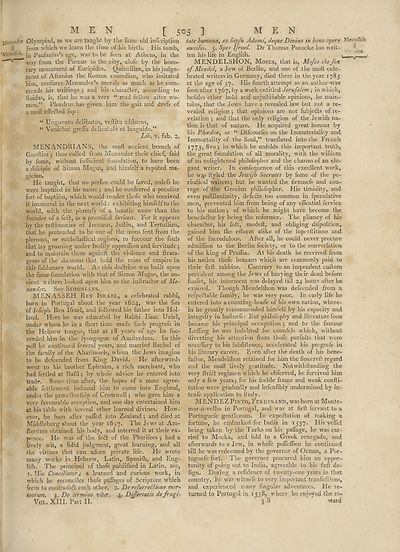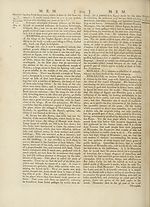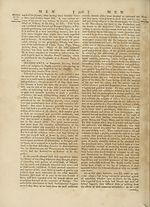Encyclopaedia Britannica, or, a Dictionary of arts, sciences, and miscellaneous literature : enlarged and improved. Illustrated with nearly six hundred engravings > Volume 13, MAT-MIC
(547) Page 505
Download files
Complete book:
Individual page:
Thumbnail gallery: Grid view | List view

MEN [5
jlcnandor Olympiad, as we are taught by the fame old infcription
i! from which we learn the time of his birth. His tomb,
Menatfeh- paufan;as’s age, was to be feen at Athens, in the
way from the Firtcus to the city, clofe by the hono¬
rary monument of Euripides. Quintilian, in his judge¬
ment of Afranius the Roman comedian, who imitated
him, cenfures Menander’s morals as much as he com¬
mends his writings j and his character, according to
Saidas, is, that he was a very “ mad fellow after wo¬
men.” Phaedrus has given him the gait and drefs of
a molt affcdted fop :
“ Unguento delibutus, veftitu adfluens,
“ Veniebat grelfu delicatulo et languido.”
Lib. v. fab. 2.
MEN ANDRIANS, the molt ancient branch of
Gnoftics j thus called from Menander their chief, faid
by fome, without fufficient foundation, to have been
a difciple of Simon Magus, and himfelf a reputed ma¬
gician.
He taught, that no perfon could be faved, unlefs he
were bapfcifed in his name } and he conferred a peculiar
fort of baptifm, which would render thofe who received
it immortal in the next world : exhibiting himfelf to the
world, with the phrenfy of a lunatic more than the
founder of a feet, as a promifed faviour. For it appears
by the teftimonies of Irenreus, Juftin, and Tertullian,
that he pretended to be one of the aeons fent from the
pleroma, or ecclefiaitical regions, to fuccour the fouls
that lay groaning under bodily oppreflion and fervitude j
and to maintain them againft the violence and ftrata-
gems of the daemons that hold the reins of empire in
this fublunary world. As this do&rine was built upon
the fame foundation with that of Simon Magus, the an¬
cient writers looked upon him as the inftruclor of Me¬
nander. See Simonians.
MENASSEH Ben Israel, a celebrated rabbi,
born in Portugal about the year 1604, was the fon
of Jofeph Ben Ifrael, and followed his father into PIol-
land. Here lie was educated by Rabbi Ifaac Uziel,
under whom he in a fliort time made fuch progrefs in
the Hebrew tongue, that at 18 years of age he fuc-
ceeded him in the fynagogue of Amfterdam. In this
poft he continued feveral years, and married Rachel of
the family of the Abarbanels, whom the Jews imagine
to be descended from King David. He afterwards
went to his brother Ephraim, a rich merchant, who
had fettled at Eafil; by whofe advice he entered into
trade. Some time after, the hopes of a more agree¬
able fettlement induced him to come into England,
under the protefforlhip of Cromwell; who gave him a
very favourable reception, and one day entertained him
at his table with feveral other learned divines. How¬
ever, he foon after palled into Zealand; and died at
Middleburg about the year 1657. T^e Jews at Am-
fterdam obtained his body, and interred it at their ex¬
pence. He was of the fed of the Pharifees j had a
lively wit, a folid judgment, great learning, and all
the virtues that can adorn private life. He wrote
many works in Hebrew, Latin, Spanilh, and Eng-
lilh. The principal of thofe publilhed in Latin, are,
T. Mis Conciliator i a learned and curious work, in
which he reconciles thofe palfages of Scripture which
feem to contradict each other, 2. De refurre&ione mor-
tuorum. 3, De tcvmino viice, 4. Dijfertaiio defragi-
VOL. XIII, Part II.
05 ] M E N
tide humana, ex lapfu Adami, deque Divino in bona opere McraiTeh
auxilio. 5. Spes Ifrael. Dr Thomas Pococke has writ-
ten his life in Englilh. , -----
MENDELSHON, Moses, that is, Mofes the fon
of Mendel, a Jew of Berlin, and one of the molt cele¬
brated writers in Germany, died there in the year 1785
at the age of 57. His fourth attempt as an author-was
foon after 1767, by a work entitled Jerufalem ; in which,
befides other bold and unjuitifiable opinions, he main¬
tains, that the Jews have a revealed law but not a re¬
vealed religion \ that opinions are not fubjeds of re¬
velation \ and that the only religion of the Jewilh na¬
tion is that of nature. He acquired great honour by
his Phccdon, or “ Difcourfes on the Immateriality and
Immortality of the Soul,” tranflated into the French
1773, 8vo ; in which he unfolds this important truth,
the great foundation of all morality, with the wifdom
of an enlightened philofopher and the charms of an ele¬
gant writer. In confequence of this excellent work,
he was ftyled the Jewijh Socrates by fome of the pe¬
riodical writers j but he wanted the firmnefs and cou¬
rage of the Grecian philofopher. His timidity, and
even pulillanimity, defeds too common in fpeculative
men, prevented him from being of aiiy effential fervice
to his nation ; of which he might have become the
benefador by being the reformer. The pliancy of his
character, his foft, modeft, and obliging difpofition,
gained him the efteem alike of the iuperftitious and
of the incredulous. After all, he could never procure
admiffion to the Berlin fociety, or to the converfation
of the king of Pruffia. At his death he received from
his nation thofe honours which are commonly paid to
their firft rabbins. Contrary to an imprudent cuilom
prevalent among the Jews of burying their dead before
funfet, his interment was delayed till 24 hours after he
expired. Though Mendelihon was defeended from a
refpedable family, he was very poor. In early life he
entered into a counting-houfe of his own nation, where¬
in he greatly recommended himfelf by his capacity and
integrity in bufinefs: But philofophy and literature foon
became his principal occupation ; and to the famous
Lefling he was indebted for counfels which, without
diverting his attention from thofe purfuits that were
neceffary to his fubliftence, accelerated his progrefs in
his literary career. Even after the death of his bene-
faftor, Mendclfhon retained for him the fincerelt regard
and the moft lively gratitude. Notwithftanding the
very ftrict regimen which he obferved, he furvived him
only a few years 5 for his feeble frame and weak confti-
tution were gradually and infenfibly undermined by in-
tenfe application to fludy.
MENDEZ Pinto, Ferdinand, was born at Monte-
mor-o-velho in Portugal, and was at firft fervant to a
Portuguefe gentleman. In expectation of making a
fortune, he embarked for India in 1537. His veffel
being taken by the Turks on his paflage, he was car¬
ried to Mocka, and fold to a Greek renegado, and
afterwards to a Jew, in whofe poffeflion he continued
till he was redeemed by the governor of Ormus, a Por¬
tuguefe fort. The governor procured him an oppor¬
tunity of going out to India, agreeable to his firft de-
fign. During a refidence of twenty-one years in that
country, he was witnefs to very important tranfcclicns,
and experienced many fingular adventures. He re¬
turned to Portugal in 1558, where he enjoyed the re-
3 S vtard
jlcnandor Olympiad, as we are taught by the fame old infcription
i! from which we learn the time of his birth. His tomb,
Menatfeh- paufan;as’s age, was to be feen at Athens, in the
way from the Firtcus to the city, clofe by the hono¬
rary monument of Euripides. Quintilian, in his judge¬
ment of Afranius the Roman comedian, who imitated
him, cenfures Menander’s morals as much as he com¬
mends his writings j and his character, according to
Saidas, is, that he was a very “ mad fellow after wo¬
men.” Phaedrus has given him the gait and drefs of
a molt affcdted fop :
“ Unguento delibutus, veftitu adfluens,
“ Veniebat grelfu delicatulo et languido.”
Lib. v. fab. 2.
MEN ANDRIANS, the molt ancient branch of
Gnoftics j thus called from Menander their chief, faid
by fome, without fufficient foundation, to have been
a difciple of Simon Magus, and himfelf a reputed ma¬
gician.
He taught, that no perfon could be faved, unlefs he
were bapfcifed in his name } and he conferred a peculiar
fort of baptifm, which would render thofe who received
it immortal in the next world : exhibiting himfelf to the
world, with the phrenfy of a lunatic more than the
founder of a feet, as a promifed faviour. For it appears
by the teftimonies of Irenreus, Juftin, and Tertullian,
that he pretended to be one of the aeons fent from the
pleroma, or ecclefiaitical regions, to fuccour the fouls
that lay groaning under bodily oppreflion and fervitude j
and to maintain them againft the violence and ftrata-
gems of the daemons that hold the reins of empire in
this fublunary world. As this do&rine was built upon
the fame foundation with that of Simon Magus, the an¬
cient writers looked upon him as the inftruclor of Me¬
nander. See Simonians.
MENASSEH Ben Israel, a celebrated rabbi,
born in Portugal about the year 1604, was the fon
of Jofeph Ben Ifrael, and followed his father into PIol-
land. Here lie was educated by Rabbi Ifaac Uziel,
under whom he in a fliort time made fuch progrefs in
the Hebrew tongue, that at 18 years of age he fuc-
ceeded him in the fynagogue of Amfterdam. In this
poft he continued feveral years, and married Rachel of
the family of the Abarbanels, whom the Jews imagine
to be descended from King David. He afterwards
went to his brother Ephraim, a rich merchant, who
had fettled at Eafil; by whofe advice he entered into
trade. Some time after, the hopes of a more agree¬
able fettlement induced him to come into England,
under the protefforlhip of Cromwell; who gave him a
very favourable reception, and one day entertained him
at his table with feveral other learned divines. How¬
ever, he foon after palled into Zealand; and died at
Middleburg about the year 1657. T^e Jews at Am-
fterdam obtained his body, and interred it at their ex¬
pence. He was of the fed of the Pharifees j had a
lively wit, a folid judgment, great learning, and all
the virtues that can adorn private life. He wrote
many works in Hebrew, Latin, Spanilh, and Eng-
lilh. The principal of thofe publilhed in Latin, are,
T. Mis Conciliator i a learned and curious work, in
which he reconciles thofe palfages of Scripture which
feem to contradict each other, 2. De refurre&ione mor-
tuorum. 3, De tcvmino viice, 4. Dijfertaiio defragi-
VOL. XIII, Part II.
05 ] M E N
tide humana, ex lapfu Adami, deque Divino in bona opere McraiTeh
auxilio. 5. Spes Ifrael. Dr Thomas Pococke has writ-
ten his life in Englilh. , -----
MENDELSHON, Moses, that is, Mofes the fon
of Mendel, a Jew of Berlin, and one of the molt cele¬
brated writers in Germany, died there in the year 1785
at the age of 57. His fourth attempt as an author-was
foon after 1767, by a work entitled Jerufalem ; in which,
befides other bold and unjuitifiable opinions, he main¬
tains, that the Jews have a revealed law but not a re¬
vealed religion \ that opinions are not fubjeds of re¬
velation \ and that the only religion of the Jewilh na¬
tion is that of nature. He acquired great honour by
his Phccdon, or “ Difcourfes on the Immateriality and
Immortality of the Soul,” tranflated into the French
1773, 8vo ; in which he unfolds this important truth,
the great foundation of all morality, with the wifdom
of an enlightened philofopher and the charms of an ele¬
gant writer. In confequence of this excellent work,
he was ftyled the Jewijh Socrates by fome of the pe¬
riodical writers j but he wanted the firmnefs and cou¬
rage of the Grecian philofopher. His timidity, and
even pulillanimity, defeds too common in fpeculative
men, prevented him from being of aiiy effential fervice
to his nation ; of which he might have become the
benefador by being the reformer. The pliancy of his
character, his foft, modeft, and obliging difpofition,
gained him the efteem alike of the iuperftitious and
of the incredulous. After all, he could never procure
admiffion to the Berlin fociety, or to the converfation
of the king of Pruffia. At his death he received from
his nation thofe honours which are commonly paid to
their firft rabbins. Contrary to an imprudent cuilom
prevalent among the Jews of burying their dead before
funfet, his interment was delayed till 24 hours after he
expired. Though Mendelihon was defeended from a
refpedable family, he was very poor. In early life he
entered into a counting-houfe of his own nation, where¬
in he greatly recommended himfelf by his capacity and
integrity in bufinefs: But philofophy and literature foon
became his principal occupation ; and to the famous
Lefling he was indebted for counfels which, without
diverting his attention from thofe purfuits that were
neceffary to his fubliftence, accelerated his progrefs in
his literary career. Even after the death of his bene-
faftor, Mendclfhon retained for him the fincerelt regard
and the moft lively gratitude. Notwithftanding the
very ftrict regimen which he obferved, he furvived him
only a few years 5 for his feeble frame and weak confti-
tution were gradually and infenfibly undermined by in-
tenfe application to fludy.
MENDEZ Pinto, Ferdinand, was born at Monte-
mor-o-velho in Portugal, and was at firft fervant to a
Portuguefe gentleman. In expectation of making a
fortune, he embarked for India in 1537. His veffel
being taken by the Turks on his paflage, he was car¬
ried to Mocka, and fold to a Greek renegado, and
afterwards to a Jew, in whofe poffeflion he continued
till he was redeemed by the governor of Ormus, a Por¬
tuguefe fort. The governor procured him an oppor¬
tunity of going out to India, agreeable to his firft de-
fign. During a refidence of twenty-one years in that
country, he was witnefs to very important tranfcclicns,
and experienced many fingular adventures. He re¬
turned to Portugal in 1558, where he enjoyed the re-
3 S vtard
Set display mode to:
![]() Universal Viewer |
Universal Viewer | ![]() Mirador |
Large image | Transcription
Mirador |
Large image | Transcription
Images and transcriptions on this page, including medium image downloads, may be used under the Creative Commons Attribution 4.0 International Licence unless otherwise stated. ![]()
| Permanent URL | https://digital.nls.uk/192668273 |
|---|
| Attribution and copyright: |
|
|---|
| Description | Ten editions of 'Encyclopaedia Britannica', issued from 1768-1903, in 231 volumes. Originally issued in 100 weekly parts (3 volumes) between 1768 and 1771 by publishers: Colin Macfarquhar and Andrew Bell (Edinburgh); editor: William Smellie: engraver: Andrew Bell. Expanded editions in the 19th century featured more volumes and contributions from leading experts in their fields. Managed and published in Edinburgh up to the 9th edition (25 volumes, from 1875-1889); the 10th edition (1902-1903) re-issued the 9th edition, with 11 supplementary volumes. |
|---|---|
| Additional NLS resources: |
|

